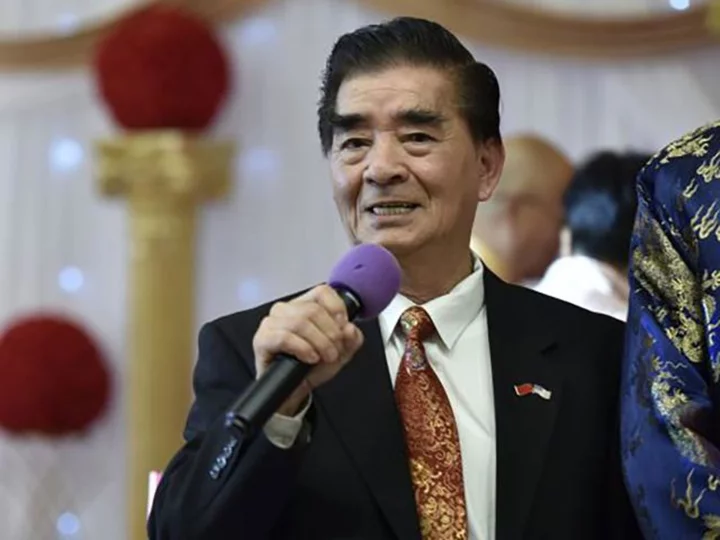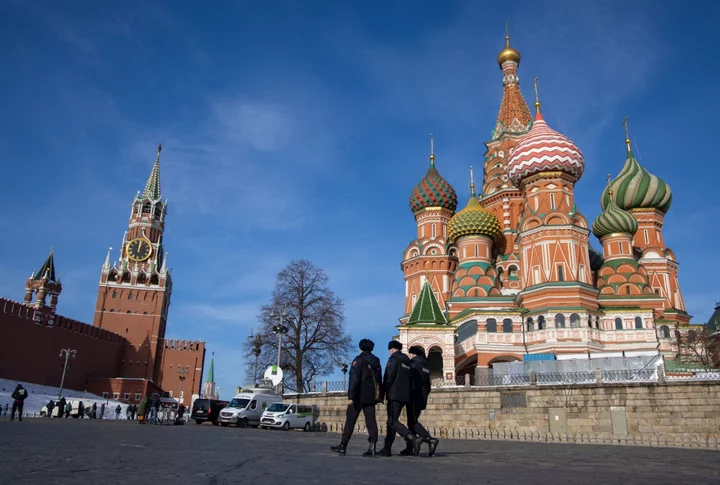The elderly American citizen sentenced to life in prison by a Chinese court Monday on spying charges is a veteran leader of several pro-Beijing groups in the United States, who has rubbed shoulders for years with senior Chinese government officials, CNN reporting and research has found.
The court in eastern China that sentenced John Shing-Wan Leung, 78, did not provide additional details on the espionage charges or Leung's personal background, apart from his US passport and Hong Kong ID numbers and date of birth.
Searching in previous Chinese state media reports, CNN found a man with the same Chinese name and date of birth as Leung, who has headed several pro-China organizations in the US, including a group promoting Beijing's claims over Taiwan, the Texas Council for the Promotion of China's Peaceful Reunification.
In the Texas business registry, "John Leung" is listed as one of the three directors of that same group.
Another director listed on the registry, David Tang, confirmed to CNN that the now-imprisoned Leung is an associate at the organization and his long-time friend.
"He's a very famous person, known by many overseas Chinese in the southern US," Tang said.
Despite Leung's comparative fame and influence, no public information had emerged about his detention in China until Monday's verdict and sentencing announcement. Leung was seized by state security authorities in Suzhou, Jiangsu province on April 15, 2021, according to the court statement.
Cases involving espionage -- a broad and vaguely defined charge -- are usually handled behind closed doors in China, where the judicial system has a conviction rate of around 99%.
The US State Department said Monday that it was "aware of the sentencing of a US citizen in the People's Republic of China on charges of espionage."
State Department spokesperson Vedant Patel did not get into further specifics, citing "privacy concerns" but stressed that the US seeks to provide "all appropriate assistance," including consular access, whenever a US citizen is detained abroad.
Asked if Leung has been designated as wrongfully detained, Patel said that "broadly on wrongfully detained designations that work, is a deliberative process that is ongoing."
CNN was unable to contact Leung's family members despite repeated efforts.
Communist Party links
Leung's Texas organization is affiliated with a pro-China, Taiwan-focused lobby group based in Washington DC, the National Association for China's Peaceful Unification (NACPU), where Leung sits on the board of directors as an executive member, according to cached versions of the NACPU's website.
The NACPU was designated as a foreign mission in 2020 by the Trump administration, which accused it of being controlled by the Chinese Communist Party's United Front Work Department -- a far-reaching arm of the ruling party tasked with spreading Beijing's influence and propaganda overseas.
In response to the designation, China's Foreign Ministry said it was "completely unjustified for the US side to impose discriminatory restrictions" on NACPU.
The NACPU and its branches in the US are part of a global network of similar organizations seen as a Beijing-backed influence operation, and have come under growing scrutiny in the US in recent years.
Reports published by Chinese-language media in Texas and China's state media show Leung's long-running access to senior Chinese officials.
Leung was photographed with multiple Chinese ambassadors to the US dating back two decades, including Zhang Yesui and Yang Jiechi, who would later become China's top diplomat under leader Xi Jinping.
Leung also organized or attended events with officials at the Chinese consulate in Houston, which was forced to close in 2020 after US officials alleged it was part of a larger Chinese espionage effort using diplomatic facilities around the US.
During trips to China, Leung has also met with multiple local officials, including in Jiangsu, where he was detained and sentenced.
Boasting the second-highest GDP of all Chinese provinces, Jiangsu is an economic powerhouse and home to China's semiconductor industry.
'Outstanding representative'
In previous reporting, Chinese state media has extolled Leung as an "outstanding representative" of "patriotic" overseas Chinese for his decades-long efforts in promoting social, cultural and business exchanges between the US and China.
According to a 2004 report in the People's Daily, the official mouthpiece of the Chinese Communist Party, Leung was born in Hong Kong and studied in the United Kingdom at the age of 16.
He later moved to the United States, where he worked for the United Nations at its headquarters in New York before becoming a businessman, the report said.
In 1985, Leung founded a friendship association between Oklahoma City and the southern Chinese metropolis of Guangzhou, followed by the Leung Cultural Exchange foundation in 1997, according to the People's Daily.
"As a descendant of China, I am extremely honored and proud of what the new China has achieved in the past 55 years," Leung was quoted as saying in the report.
He has led American officials and business delegations to China to foster business deals and social exchanges, and hosted Chinese delegations visiting the US, according to the report.
It said Leung's efforts were "fully affirmed" by the Chinese government and leaders, and he had been received by Chinese leaders during their visits to the US as an "outstanding representative" of overseas Chinese.
Xi, China's most powerful leader in decades, has called on overseas Chinese to join the "great rejuvenation of the Chinese nation" -- a nationalistic agenda seeking to reclaim the country's rightful place in the world. On May 9, Xi met hundreds of representatives hailing from major overseas Chinese associations around the world in the Great Hall of the People in Beijing.
Crackdown on espionage
In more recent state media reports, Leung was named the deputy director of the Jiangsu Overseas Exchange Association, a state-affiliated organization.
In 2014, he met with the director of Jiangsu Provincial Overseas Chinese Affairs Office during a visit to Nanjing, the provincial capital.
The official, Wang Hua, praised Leung for his "positive contributions" to China and Jiangsu, expressing the hope that Leung could visit Jiangsu more often and bring more American economic and high-tech talents to invest in the province, according to a statement from the office.
In addition to promoting US-China exchanges, Leung and his organizations have also served to amplify Beijing's political messages in the US.
In 2020, Leung's Texas Council for the Promotion of China's Peaceful Reunification issued a statement to voice support for Beijing's imposition of a sweeping national security law on Hong Kong which has silenced the city's pro-democracy opposition.
The sentencing of Leung comes at a time when relations between Beijing and Washington are at their lowest point in half a century amid intensifying rivalry over trade, technology, geopolitics and military supremacy.
It also comes as American and Chinese officials are resuming high-level engagements since a dispute over a suspected Chinese spy balloon shattered efforts to mend ties earlier this year.
There are at least three other Americans publicly known to be imprisoned in China -- Kai Li, Mark Swidan, and David Lin -- all of whom have been designated as wrongfully detained by the US State Department.
In April, China passed a wide-ranging amendment to its already sweeping counter-espionage law, which will take effect from July 1.
The new legislation expanded the definition of espionage from covering state secrets and intelligence to any "documents, data, materials or items related to national security and interests," and to include cyberattacks against state organs or critical information infrastructure.









